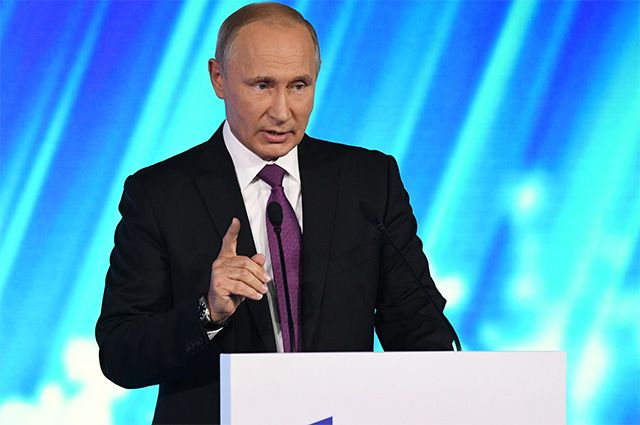
Published: November 3rd, 2017
In December, the government should submit a report to the president on the outcome of the discussion of the tax reform. Vladimir Putin started this discussion. About a year ago, in a message to the Federal Assembly, he instructed the government in 2017 to determine the contours of the tax system for the next electoral cycle, and adopt all the necessary laws in 2018.
The report is being worked out, the representative of the Ministry of Finance points out, but there are no final decisions on the adjustment of the tax system. The final decision may be a proposal to keep the current system, told the "Vedomosti" four officials of the financial and economic block. Most likely, the president will be told that business and the economy are good and so, believes one of them. In 2014, Mr. Putin has already announced a four-year moratorium on the growth of the tax burden, which, however, repeatedly violated.
The only actively discussed version of the reform was a tax maneuver - a reduction in insurance premiums and an increase in VAT to 22%, another official explained: the idea was not officially rejected, but met the active resistance of the social bloc, did not receive support and, in fact, died. As long as there are two options, another interlocutor from Vedomosti says: it is a little tricky to write in the report on the need to reduce the burden on labor, increasing indirect taxes, or to limit oneself to point setting - already approved or even envisaged by the three-year budget. 2017 is running out, there are no decisions, it is unlikely that you will be able to keep within the terms mentioned by the president, the third official is skeptical.
Representatives of Premier Dmitry Medvedev, First Deputy Prime Minister Igor Shuvalov and the Economic Development Ministry declined to comment.
The Ministry of Finance and the Ministry of Economic Development, which was headed by former deputy finance minister Maxim Oreshkin, suggested using a maneuver to reduce the workload too high. So they expected to whitewash the labor market, which would lead to an increase in state revenues. But the price was high. The abolition of a reduced rate of contributions for relatively high salaries (pension contributions - 10% for salaries over 876,000 rubles this year) would increase the burden on them. A rise in VAT would have placed a burden on the entire population, increasing inflation. The government's social bloc pointed out that due to a decrease in contributions, the FIU will be even more dependent on the budget, which would violate the insurance principles of the pension system. To avoid this, the Ministry of Finance offered to pay the fixed part of the insurance pension to the budget.
Most of the maneuver should win the sectors of state administration, state employees and agriculture, assessed the Ministry of Finance, and lose - construction, extraction and private services. The business opinion is divided, says a member of the Bureau of the Russian Union of Industrialists and Entrepreneurs, but with a gradual recovery of the economy, nervousness is also reduced - the opportunity to shift the increase in VAT to prices is growing.
The maneuver would entail other changes, primarily in the pension system, officials admitted. It would be necessary to change the structure of the pension system, sources of financing of pension payments, says the head of the Economic Expert Group Evsei Gurvich. This is the main obstacle, admits the expert, who participated in the discussion of the maneuver. It is unlikely that the maneuver would lead to a moribund labor market, notes Gurvich. This can be achieved through measures of tax control, for example, with the help of new online cash registers, the official acknowledges.
From other tax changes, the government refused even earlier. For example, from the introduction of sales tax, other ideas are not discussed, the official says. If you change taxes, then transfer the load from the mobile base (taxes on capital) to non-mobile (consumption taxes), Gurvich said. The income tax rate is a factor of international competition for capital, and people will not go for bread to another country, because there the VAT is lower, he explains. It is better to reduce the profit tax, Ilya Sokolov, senior research associate at the Russian Academy of Sciences, agrees.
Just discussing tax reforms is damaging to a business that has been living in a state of complete uncertainty for a long time, says the tax manager of a large company. The authorities also violated the current moratorium on increasing the tax burden, for example, raising excises, limiting the possibility of reducing the profit tax for losses.
Tax stability is in itself the main value, Sokolov points out. To reduce the burden on labor can also be other measures, wrote the IMF experts, for example, increasing labor productivity. It is necessary to increase the targeting of social support, this will reduce budget expenditures and solve social problems, advises NISP director Liliya Ovcharova. The current tax system does not interfere with business, the Rector of the Russian Academy of Science and Technology Vladimir Mau said, the security of private property is more important than economic factors, and the stability of the tax system is its transformation.
Source: Vedomosti
Latest news
07.05.2018 MEF-2018: debate "Cultural policy: between individual freedom and the interests of society?"
07.05.2018 MEF-2018: Conference No. 8
07.05.2018 MEF-2018: Conference No. 4
07.05.2018 MEF-2018: Conference No.3
07.05.2018 MEF-2018: Conference No. 2
07.05.2018 MEF-2018: Conference No.1
26.04.2018 McConnell Discusses Information Warfare
20.04.2018 MEF-2018: closing plenary session
17.04.2018 Mr. Freysinger: «Skripal’s case» for relationship between Russia und European Union?
